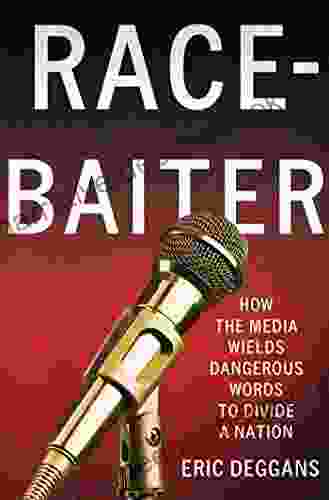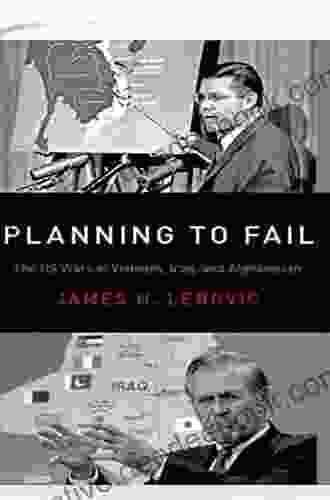The U.S. Wars in Vietnam, Iraq, and Afghanistan: Bridging the Gap

The United States has fought three major wars in Southeast Asia and the Middle East in the past half-century: the Vietnam War (1955-1975),the Iraq War (2003-2011),and the Afghanistan War (2001-2021). These conflicts have had a profound impact on the United States and the countries it has intervened in. They have also raised important questions about the nature of war, the role of the United States in the world, and the challenges of building peace in post-conflict societies.
5 out of 5
| Language | : | English |
| File size | : | 1307 KB |
| Text-to-Speech | : | Enabled |
| Screen Reader | : | Supported |
| Enhanced typesetting | : | Enabled |
| Word Wise | : | Enabled |
| Print length | : | 256 pages |
| Lending | : | Enabled |
This article provides a comprehensive overview of the U.S. wars in Vietnam, Iraq, and Afghanistan. It explores the historical context, motivations, outcomes, and legacies of these conflicts, and discusses the challenges of bridging the gap between the United States and the countries it has intervened in.
The Vietnam War
The Vietnam War was a protracted and bloody conflict that pitted the United States and its South Vietnamese allies against the communist forces of North Vietnam and their Viet Cong allies in South Vietnam. The war began in the early 1950s with the United States providing military and economic aid to the French colonial government in Vietnam. After the French were defeated in 1954, the United States continued to support the South Vietnamese government, which was led by President Ngo Dinh Diem.
The United States' involvement in Vietnam escalated dramatically in the mid-1960s as the Viet Cong launched a series of offensives against the South Vietnamese government. In response, the United States sent hundreds of thousands of troops to Vietnam and began a massive bombing campaign against North Vietnam. The war quickly became a stalemate, and both sides suffered heavy casualties.
The Vietnam War ended in 1975 with the collapse of the South Vietnamese government and the reunification of Vietnam under communist rule. The war was a major defeat for the United States, and it had a profound impact on American society and politics.
The Iraq War
The Iraq War began in 2003 with the U.S.-led invasion of Iraq. The invasion was justified by the Bush administration on the basis that Iraq possessed weapons of mass destruction and was a threat to the United States. However, no weapons of mass destruction were ever found, and the war quickly turned into a protracted counterinsurgency campaign against Iraqi insurgents.
The Iraq War was a costly and bloody conflict. Hundreds of thousands of Iraqis were killed, and millions more were displaced from their homes. The war also had a significant impact on the United States, both in terms of human and financial costs.
The Iraq War ended in 2011 with the withdrawal of U.S. troops. However, the war's legacy continues to be debated. Some argue that the war was a success because it removed Saddam Hussein from power and helped to spread democracy in the Middle East. Others argue that the war was a failure because it destabilized Iraq and led to the rise of the Islamic State of Iraq and Syria (ISIS).
The Afghanistan War
The Afghanistan War began in 2001 with the U.S.-led invasion of Afghanistan in response to the September 11 attacks. The invasion quickly toppled the Taliban government, which was harboring al-Qaeda, the terrorist group responsible for the attacks. However, the Taliban quickly regrouped and launched an insurgency against the U.S.-backed Afghan government.
The Afghanistan War has been the longest war in U.S. history. It has been a costly and bloody conflict, with hundreds of thousands of Afghans killed and millions more displaced from their homes. The war has also had a significant impact on the United States, both in terms of human and financial costs.
The Afghanistan War ended in 2021 with the withdrawal of U.S. troops. However, the war's legacy continues to be debated. Some argue that the war was a success because it toppled the Taliban government and helped to spread democracy in Afghanistan. Others argue that the war was a failure because it destabilized Afghanistan and led to the rise of the Taliban.
Similarities and Differences
The U.S. wars in Vietnam, Iraq, and Afghanistan share a number of similarities. All three wars were fought in countries with complex histories and cultures. All three wars involved the use of counterinsurgency tactics. And all three wars ended with the withdrawal of U.S. troops.
However, there are also important differences between the three wars. The Vietnam War was fought in the context of the Cold War, while the Iraq War and the Afghanistan War were fought in the context of the War on Terror. The Vietnam War was primarily a conventional war, while the Iraq War and the Afghanistan War were primarily counterinsurgency campaigns. And the Vietnam War ended with a communist victory, while the Iraq War and the Afghanistan War ended with the withdrawal of U.S. troops.
Challenges of Bridging the Gap
The U.S. wars in Vietnam, Iraq, and Afghanistan have created a significant gap between the United States and the countries it has intervened in. This gap is due to a number of factors, including the use of violence, the destruction of infrastructure, the displacement of populations, and the violation of human rights.
Bridging this gap is a challenging task. It will require a long-term commitment from the United States to help rebuild the countries it has intervened in and to reconcile with the people who have suffered as a result of its wars. It will also require a willingness on the part of the United States to listen to the concerns of the people it has intervened in and to be held accountable for its actions.
The U.S. wars in Vietnam, Iraq, and Afghanistan have been a major
5 out of 5
| Language | : | English |
| File size | : | 1307 KB |
| Text-to-Speech | : | Enabled |
| Screen Reader | : | Supported |
| Enhanced typesetting | : | Enabled |
| Word Wise | : | Enabled |
| Print length | : | 256 pages |
| Lending | : | Enabled |
Do you want to contribute by writing guest posts on this blog?
Please contact us and send us a resume of previous articles that you have written.
 Book
Book Novel
Novel Chapter
Chapter Text
Text Story
Story Library
Library Paperback
Paperback Magazine
Magazine Paragraph
Paragraph Bookmark
Bookmark Glossary
Glossary Foreword
Foreword Preface
Preface Synopsis
Synopsis Annotation
Annotation Tome
Tome Bestseller
Bestseller Classics
Classics Library card
Library card Autobiography
Autobiography Memoir
Memoir Reference
Reference Encyclopedia
Encyclopedia Dictionary
Dictionary Thesaurus
Thesaurus Narrator
Narrator Character
Character Librarian
Librarian Catalog
Catalog Stacks
Stacks Archives
Archives Periodicals
Periodicals Study
Study Scholarly
Scholarly Reserve
Reserve Journals
Journals Reading Room
Reading Room Reading List
Reading List Book Club
Book Club Theory
Theory James C Robinson
James C Robinson Peter Browning
Peter Browning Kevin Fortunato
Kevin Fortunato Jimmy Newell
Jimmy Newell Georg Fischer
Georg Fischer Katie Startzman
Katie Startzman Elizabeth Hoyt
Elizabeth Hoyt L J Shen
L J Shen H Peter Alesso
H Peter Alesso Robert Skrob
Robert Skrob Brandon Scott
Brandon Scott Scott A Frisch
Scott A Frisch Karen Katchur
Karen Katchur Vampyre Lunakaray
Vampyre Lunakaray Andrew J Pankratz
Andrew J Pankratz David Healey
David Healey Frederik Van Passel
Frederik Van Passel E T A Hoffmann
E T A Hoffmann John R Clark
John R Clark Gwenda Bond
Gwenda Bond
Light bulbAdvertise smarter! Our strategic ad space ensures maximum exposure. Reserve your spot today!
 Pablo NerudaFollow ·7.3k
Pablo NerudaFollow ·7.3k H.G. WellsFollow ·6.8k
H.G. WellsFollow ·6.8k Chase MorrisFollow ·18.9k
Chase MorrisFollow ·18.9k Doug PriceFollow ·10k
Doug PriceFollow ·10k John MiltonFollow ·11.7k
John MiltonFollow ·11.7k Aaron BrooksFollow ·6.4k
Aaron BrooksFollow ·6.4k Stephen KingFollow ·12.7k
Stephen KingFollow ·12.7k Roberto BolañoFollow ·15k
Roberto BolañoFollow ·15k

 Dallas Turner
Dallas TurnerParasols and Peril: Adventures in Grace
In the quaint town...

 Caleb Carter
Caleb CarterFlight Attendant Joe: A Dedicated Professional in the...
Flight Attendant Joe...

 Jerry Ward
Jerry WardPick Lottery The List For 23 States August 15 2024
The Pick Lottery is a multi-state lottery...

 Hudson Hayes
Hudson HayesHow the Media Wields Dangerous Words to Divide a Nation
In a world where the media is...

 Curtis Stewart
Curtis StewartThe Magic Mala: A Story That Changes Lives
In the realm of ancient traditions and...

 Raymond Parker
Raymond ParkerEarthly Meditations: A Poetic Tapestry of Nature,...
In the realm of contemporary...
5 out of 5
| Language | : | English |
| File size | : | 1307 KB |
| Text-to-Speech | : | Enabled |
| Screen Reader | : | Supported |
| Enhanced typesetting | : | Enabled |
| Word Wise | : | Enabled |
| Print length | : | 256 pages |
| Lending | : | Enabled |












